The George Cross (GC) is the highest award bestowed by the British government for non-operational gallantry or gallantry not in the presence of an enemy. In the British honours system, the George Cross, since its introduction in 1940, has been equal in stature to the Victoria Cross, the highest military award for valour. It is awarded "for acts of the greatest heroism or for most conspicuous courage in circumstance of extreme danger", not in the presence of the enemy, to members of the British armed forces and to British civilians. Posthumous awards have been allowed since it was instituted. It was previously awarded to residents of Commonwealth countries, most of which have since established their own honours systems and no longer recommend British honours. It may be awarded to a person of any military rank in any service and to civilians including police, emergency services and merchant seamen. Many of the awards have been personally presented by the British monarch to recipients or, in the case of posthumous awards, to next of kin. The investitures are usually held at Buckingham Palace.
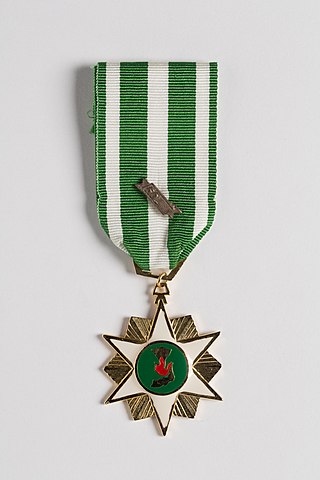
The Republic of Vietnam Campaign Medal, also known as the Vietnam Campaign Medal, is a South Vietnamese military campaign medal which was created in 1949, and awarded to French military personnel during the First Indochina War. During the Vietnam War, the South Vietnamese government awarded the Republic of Vietnam Campaign Medal with Device to members of the South Vietnamese military for wartime service and on March 24, 1966, to members of the U.S. military for support of operations in Vietnam. In May 1966, other allied foreign military personnel became eligible for the award.

The Pacific Star is a military campaign medal instituted by the United Kingdom in May 1945 for award to British and Commonwealth forces who served in the Pacific Campaign from 1941 to 1945, during the Second World War.
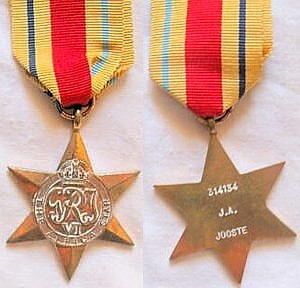
The Africa Star is a military campaign medal, instituted by the United Kingdom on 8 July 1943 for award to British and Commonwealth forces who served in North Africa between 10 June 1940 and 12 May 1943 during the Second World War.

The Africa Service Medal is a South African campaign medal for service during the Second World War, awarded to members of the Union Defence Forces, the South African Police and the South African Railways Police. The medal was originally intended for service in Africa, but it was later extended to cover service anywhere in the world.
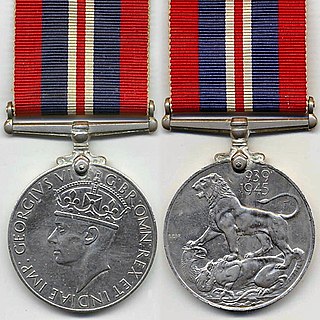
The War Medal 1939–1945 is a campaign medal which was instituted by the United Kingdom on 16 August 1945, for award to citizens of the British Commonwealth who had served full-time in the Armed Forces or the Merchant Navy for at least 28 days between 3 September 1939 and 2 September 1945.
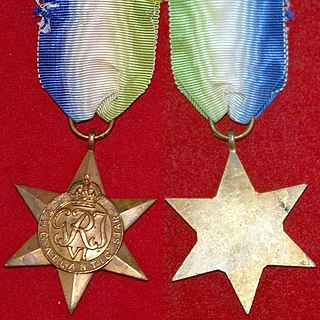
The Atlantic Star is a military campaign medal, instituted by the United Kingdom in May 1945 for award to British Commonwealth forces who took part in the Battle of the Atlantic, the longest continuous campaign of the Second World War.

The 1939–1945 Star is a military campaign medal instituted by the United Kingdom on 8 July 1943 for award to British and Commonwealth forces for service in the Second World War. Two clasps were instituted to be worn on the medal ribbon, Battle of Britain and Bomber Command.

The Air Crew Europe Star is a military campaign medal, instituted by the United Kingdom in May 1945 for award to British and Commonwealth air crews who participated in operational flights over Europe from bases in the United Kingdom during the Second World War.

The Burma Star is a military campaign medal, instituted by the United Kingdom in May 1945 for award to British and Commonwealth forces who served in the Burma Campaign from 1941 to 1945, during the Second World War.
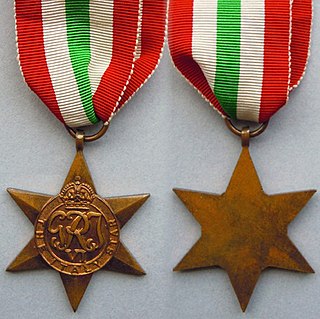
The Italy Star is a military campaign medal, instituted by the United Kingdom in May 1945 for award to British Commonwealth forces who served in the Italian Campaign from 1943 to 1945, during the Second World War.

The France and Germany Star is a military campaign medal, instituted by the United Kingdom in May 1945 for award to British Commonwealth forces who served in France, Belgium, Luxembourg, the Netherlands or Germany and adjacent sea areas between 6 June 1944 and 8 May 1945, during the Second World War.

The British War Medal is a campaign medal of the United Kingdom which was awarded to officers and men and women of British and Imperial forces for service in the First World War. Two versions of the medal were produced. About 6.5 million were struck in silver and 110,000 in bronze, the latter awarded to, among others, the Chinese, Maltese and Indian Labour Corps.

The Defence Medal is a campaign medal instituted by the United Kingdom in May 1945, to be awarded to citizens of the British Commonwealth for both non-operational military and certain types of civilian war service during the Second World War.

The Gulf War Medal was a campaign medal approved in 1992, for issue to officers and men of British forces who served in Kuwait and Saudi Arabia during Operation Granby in 1990–91.

The Iraq Medal was authorised on 23 February 2004. It was a campaign medal issued to members of the British Armed Forces and certain attached personnel, who served between 20 January 2003 and 22 May 2011 on, or in support of, Operation Telic - the designation for British operations during the 2003 Invasion of Iraq and its aftermath.
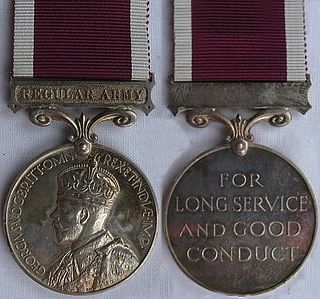
The Medal for Long Service and Good Conduct (Military) is a medal awarded to regular members of the armed forces. It was instituted by King George V in 1930 and replaced the Army Long Service and Good Conduct Medal as well as the Permanent Forces of the Empire Beyond the Seas Medal. The medal was originally awarded to Regular Army warrant officers, non-commissioned officers and men of the UK Armed Forces. It also had a number of territorial versions for the Permanent Forces of the British Dominions. The eligibility criteria were relaxed in 1947 to also allow the award of the medal to officers who had served a minimum period in the ranks before being commissioned. Since 2016, the eligibility was widened to include officers who had never served in the ranks, and so the medal can now be awarded to all regular members of the British Armed Forces who meet the required length of service.
The General Service Medal is a service medal of Canada established by Queen Elizabeth II in March 2004 and presented for the first time on 29 November 2004. It is awarded to members of the Canadian Forces, or members of allied forces, for deployment outside of Canada with Canadian Forces, though not necessarily in a theater of operations, to provide direct support, on a full-time basis, to operations in the presence of an armed enemy.

The Arctic Star is a military campaign medal instituted by the United Kingdom on 19 December 2012 for award to British Commonwealth forces who served on the Arctic Convoys north of the Arctic Circle, during the Second World War.

The Siachen Glacier Medal is awarded for service in the Siachen conflict along India's northern border with Pakistan. Awarded to the Indian Air Force for Operation Meghdoot, in support of activities in support of troops serving in the Siachen Glacier area since April 1984.

















